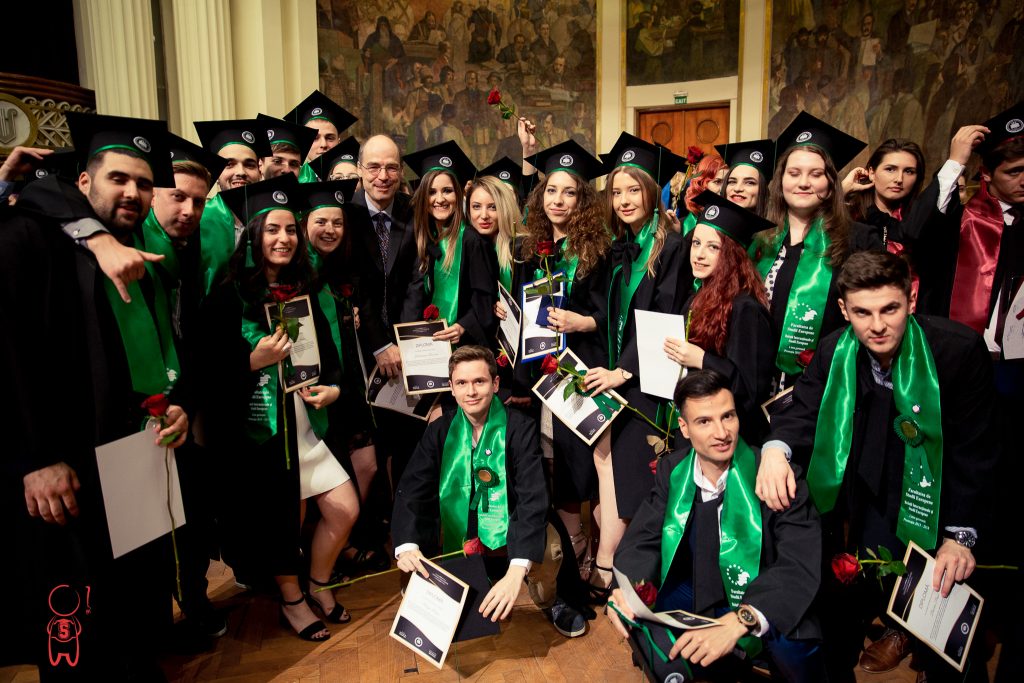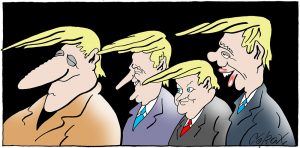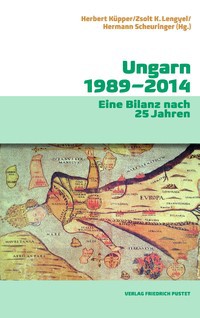On 5 July 2018, our thesis committee held a marathon session to assess 19 BA theses prepared by this year’s graduates from the German-language program in
European Studies at Babeș-Bolyai University, Cluj-Napoca. The disputations constitute the final step of three intense years of studying, the highlight of an extended
graduation procedure and the basis for advanced studies or a straight-forward professional engagement.

The following abstracts show the range of topics students have investigated under my supervision.
Die Beitrittsverhandlungen zwischen der Europäischen Union und den Balkanstaaten
Die vorliegende Arbeit untersucht, wie die EU auf dem Hintergrund früherer Erweiterungen mit Serbien über den Beitritt verhandelt und inwieweit die Beitrittsverhandlungen zu innerstaatlichen Reformen in verschiedenen Politikbereichen (Justiz, Wirtschaft, Grundrechtsschutz, Medien, Verwaltung, Migration) beitragen. Die von der EU formulierten Erwartungen und die nationalen Umsetzungsmaßnahmen werden im Detail für die Schlüsselkapitel 23 (Judikative und Grundrechte) und 24 (Justiz, Freiheit und Sicherheit) in den Beitrittsverhandlungen erörtert. Insgesamt stellt der Autor fest, dass die EU einerseits durch eine besser an die Probleme der Balkanstaaten angepasste Verhandlungsstrategie die Region stabilisiert und zu ihrer politisch-ökonomischen Modernisierung beigetragen hat, andererseits jedoch nicht die wachsenden Spannungen zwischen Serbien und Kosovo sowie die Beeinträchtigungen der Medienfreiheit in Serbien verhindern konnte.
Die EU-Beitrittsperspektive für die Türkei
Diese Arbeit analysiert den in der EU stattfindenden politischen Diskurs zum EU-Beitritt der Türkei. Nach einem kurzen Überblick zur Entwicklung der EU/EG-Türkei-Beziehungen seit 1949 skizziert die Autorin zunächst die Positionen ausgewählter EU-Mitgliedstaaten zu einem Türkei-Beitritt und unterscheidet dabei geostrategische, sicherheitspolitische, integrations- und demokratiebezogene, ökonomische und kulturelle Argumente. Dann analysiert sie die von den verschiedenen Fraktionen im Europäischen Parlament in drei zentralen Debatten (2004, 2007 und 2012) vertretenen Standpunkte. Auf dieser Basis kann sie dominante Argumentationsmuster der politischen Akteure identifizieren und zeigen, dass sich der Schwerpunkt der Türkei-Debatte im betrachteten Zeitraum von kulturell-identitätsbezogenen zu demokratie- und sicherheitspolitischen Argumenten verlagert hat.
The European Union and the Post-2009 Crisis of Moldova
This thesis describes the political development and crisis of Moldova since 2009 against the backdrop of the Eastern Partnership policy initiated by the EU. A particular focus is placed on the public political discourse and the situation of the media in Moldova. A key finding of the thesis is that Moldova does not constitute a failed state, but may be characterized as a “captive state” that is stuck between two paths of development: closer integration with the EU versus accession to the Eurasian Economic Union established by Belarus, Kazakhstan and Russia in 2015. Due to its significant deficits of democracy and the rule of law, Moldova does not fulfill the EU’s political condition for becoming an EU member state.
Die Implementation grenzüberschreitender Projekte zwischen Rumänien und der Ukraine
Die Arbeit beschreibt ein vom Kreismuseum Satu Mare gemeinsam mit der Staatlichen Universität Transkarpatien Ujhorod 2011-12 realisiertes Projekt zur Erforschung und Erhaltung des grenzüberschreitenden Kulturerbes. Dieses Projekt wurde als Fallstudie für den Zustand und die Entwicklung der rumänisch-ukrainischen Beziehungen ausgewählt. Außerdem wird ein Überblick zur Kohäsionspolitik der EU und zum European Neighbourhood and Partnership Instrument gegeben, das die EU eingerichtet hat, um unter anderem die Länder der Östlichen Partnerschaft finanziell zu unterstützen.
Die sicherheitspolitische Dimension des Transnistrien-Konfliktes
Die vorliegende Arbeit fragt, inwieweit die existierenden Institutionen und Politiken zur Regelung des Transnistrien-Konfliktes die von diesem Konflikt ausgehenden drei zentralen Sicherheitsrisiken für Moldova, die Region und die EU wirksam einschränken. Diese Risiken bestehen in einer erneuten militärischen Eskalation, unterschiedlichen Formen grenzüberschreitender organisierter Kriminalität (Schmuggel, Menschenhandel) sowie in einer „state capture“ durch einflussreiche ökonomisch-politische Akteure („Oligarchen“). Zur Verringerung dieser Risiken wurden unter anderem bereits unmittelbar nach dem bewaffneten Konflikt 1992 eine Gemeinsame Kontrollkommission und 2005 die EU Border Assistance Mission to Moldova and Ukraine gegründet. Die EU hat Transnistrien in das 2014 mit Moldova unterzeichnete Assoziierungsabkommen einbezogen. Die Arbeit zeigt jedoch, dass die existierenden Präventionsansätze keinen dauerhaften Schutz gegen die Sicherheitsrisiken bieten und daher durch ein stärkeres Engagement der EU in der Konfliktbeilegung ergänzt werden sollten.
Poland’s Policy Towards the European Union
The present thesis studies how political elites in Poland have discussed about Poland’s position and policy towards the European Union. These debates provide an important background to the ongoing conflict between the EU and the Polish government over the rule of law. The emergence, positions and constellations of political parties in Poland are analyzed as well as the relevance of the Catholic tradition in Poland. The populist rhetoric used by some politicians in Poland tends to resonate with, and to reinforce popular mistrust vis-à-vis the EU. An in-depth analysis of interview statements made by the president of the governing party Prawo i Sprawiedliwość shows how the government seeks to strengthen its negotiating position through rhetorical opposition to the EU, while aiming to preserve a dialogue with the Union.
Die Nebenwirkungen des Neoliberalismus für Rumänien
Die Arbeit studiert die Auswirkungen des „Neoliberalismus“ und der mit ihm verbundenen multinationalen Unternehmen auf die Wirtschaft und Arbeitswelt in Rumänien. Dabei werden anhand einer eigens erstellten Umfrage und einer Fallstudie sowohl die Arbeitsbedingungen in multinationalen Unternehmen betrachtet, als auch die makroökonomischen und –sozialen Prozesse, denen Rumänien infolge der Globalisierung und transnationalen ökonomischen Integration ausgesetzt ist. Ein zentraler Befund der Arbeit ist, dass die Integration in das globale Wirtschaftssystem einerseits die Unterschiede zwischen Rumänien und dem Westen verringerte, andererseits sozioökonomische, regionale, sektorale und inter-generationale Disparitäten innerhalb Rumäniens vergrößerte und einige Entwicklungsdefizite in Rumänien aufgrund der Zerstörung bestehender Wirtschaftsstrukturen vertiefte.
The Role of Military Cooperation in International Security, the Nexus of the INF Treaty and the Anti-Ballistic Missile Shield
read more




